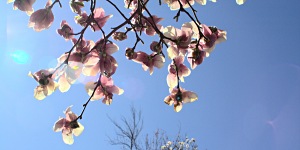Leaving the Leaves
As a result of the recent United Nations Climate Summit, climate change was at the center of the news in the last two weeks. I suspect that many of us are deeply concerned about the future of the earth and of humanity. We want to help reduce harmful carbon emissions but we don’t know what further actions to take.
I picked the subject of leaf blowers to talk about because in the next few weeks they will be everywhere, dealing with the fallen leaves and litter on Palisades properties. Our article is not a call to action by the climate police, but is intended to provide useful information in case you are concerned about the effects of leaf blower use on your property. This is an issue where even small steps will help. In these articles we look back at what we used to do in the past, give the facts about the effects of gas-operated leaf blowers, and describe new electric leaf blowers that reduce harmful effects on the environment (see the article by Paul Riccobono). We also include an article on leaf blower courtesy by Rich Rasmussen, a local landscaper.
In the past, many people raked their leaves in the fall or hired teenagers to do it. Leaves were raked into piles and burned, or piled on a corner of the property to decay into useful mulch. Some were piled on flower-beds to protect them from extreme temperatures. Once the leaves were gone, the ground was left alone for the winter. These days, few people have time to rake their own leaves, or even to blow their leaves. Yet for years we managed with very little help from landscapers after the leaves had fallen in October. Perhaps our yards were a little messier, but we were used to it and it did no harm. When leaf blowers were first introduced, they were used only in the autumn to move fallen leaves. Today there are some people who arrange to have leaf blowers clean up their property every week of the year.
These blowers are so bad for our health and so bad for the environment that they have been banned in many communities and even in some countries. They have harmful effects on the people who operate them, as well as on anyone in the area. Their emissions also contribute to climate change.
The noise from gas-operated leaf blowers, which can exceed 100 decibels, increases stress and contributes to hearing loss. OSHA requires protection at 85 decibels.
The particulates released into the air from these blowers damage our respiratory systems and can cause allergies and disease. They have their greatest effects on the landscape workers who use them.
Emissions from these blowers include carbon monoxide, which contributes to ground-level ozone, nitrous oxides, which contribute to smog and acid rain, and hydrocarbons, which can be carcinogenic. They are a hazard to public health. Using a two-stroke gas-fueled leaf blower for half an hour contributes as many hydro-carbons as driving a pick-up truck for 3,900 miles.
After you have read all three parts of this article you may decide that there are steps you can take to reduce the harmful effects of leaf blowers. You could cut back from a weekly yard cleaning over the winter to once every two weeks, or even once a month. You could buy one of the new electric leaf blowers and use it yourself or ask your landscaper to use it when he blows the debris from your yard. Or you could do nothing—it's up to you. Please write to 10964 at PO Box 201 if you have thoughts about this article you would like to share.
The Atlantic magazine ran a series of good articles on leaf blowers recently; a link to one of them follows: the Atlantic.com
Leaf Blower Review (by a former skeptic)
I will start by admitting skepticism towards any battery powered yard implement. I grew up siphoning gas and mixing two stroke oil. I considered it normal to smell like Mario Andretti after a day of yard work from all of the engine exhaust. This changed when I purchased a cordless electric chainsaw. At first I could almost hear my Stihl 72cc gas chainsaw laughing at the little electric saw as they lay next to each other. Over the next year it was the gas chainsaw that was covered in dust while my little cordless machine took care of any small job I put in front of it with the press of a button.
My first experience with an electric leaf blower a few years ago was not as convincing. It cleaned my deck off, then needed recharging. It cleaned my porch off, then needed recharging. It was not practical for anything more than small chores. When a friend recommended a new cordless electric blower I had my reservations from the start. How much better could one be only a few years later? What major technological advances could have possibly been made?
It turns out a lot. Improvements in performance and convenience have convinced me these machines are now a real player in the game. While the performance gap has been closed, there has been a cost disparity between electric and gas blowers of equal performance. But the new EGO LB6004 backpack blower with a lithium-ion 7.5Ah battery and 550W rapid charger is eight times quieter than a gas-powered blower and sells for a reasonable $398. It is top-rated by Consumer Reports and has an improved backpack harness.
The advantages of the electric machine start piling up fast. The thought of never needing to fill a blower with gas is realistic when the battery pack keeps it running at high speed for almost two hours. The weight of the EGO (with battery pack) comes in at about 25 pounds, a little less than gas models. Noise pollution is where this (and most) electric models come out on top. Perhaps the greatest advantage the electric machines hold over their gas cousins is not measurable in cost, sound or airspeed but is in the reduced impact they have on the environment and the people who use them. Switching from gas to electric leaf blowers is an easy way to reduce noise, air pollution and harmful emissions.
Paul Riccobono
LEAF BLOWER COURTESY GOES A LONG WAY
“Weather permitting,” avoid early start times. After 8am usually works for all.
Try to accommodate neighbors having outside activities by not blowing until after they're finished. Nature is the best sound.
Try to be finished blowing before 6pm. It's been a long day for everyone.
On weekends, try to curtail early-bird start-up. Late morning to early afternoon works best.
Sunday enjoy a noise-free day with your family, pets, friends and of course your neighbors.
If possible, upgrade your blower to a newer model. I recommend Stihl and Red Max; they have lower noise ratings and are cleaner running, with lower emissions. They always start!
Always wear ear and eye protection. Be careful with hand-held units; they can cause tennis elbow, and you definitely don't want that.
Richard Rasmussen

